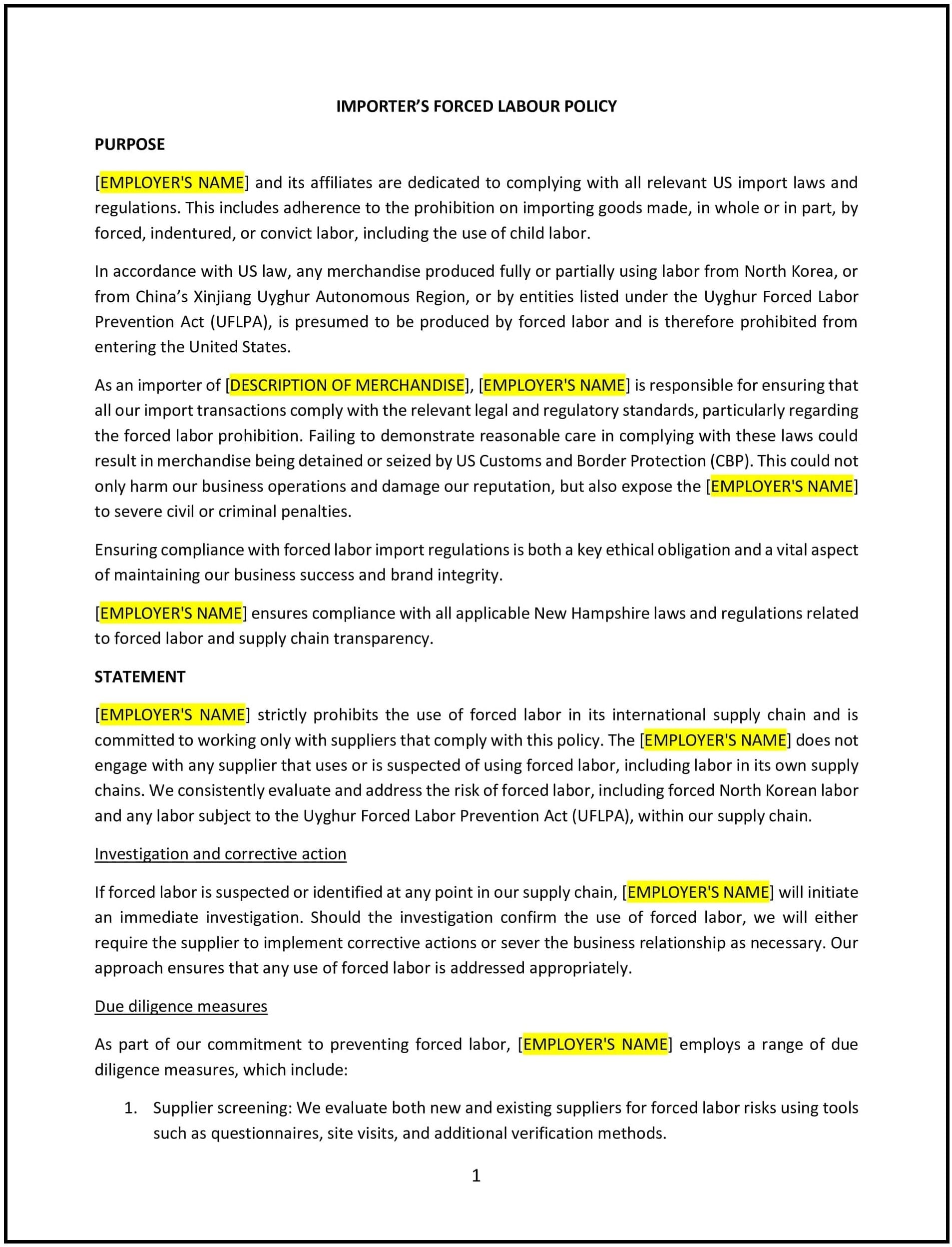Importer's forced labour policy (New Hampshire): Free template
Got contracts to review? While you're here for policies, let Cobrief make contract review effortless—start your free review now.

Customize this template for free
Importer's forced labour policy (New Hampshire)
An importer's forced labour policy helps New Hampshire businesses ensure that they do not engage in or support the use of forced labour in their supply chains. This policy outlines the company’s commitment to ethical sourcing, including conducting due diligence to prevent the use of forced, coerced, or involuntary labour in the manufacturing or procurement processes.
By adopting this policy, businesses in New Hampshire can promote ethical business practices, protect their brand reputation, and comply with relevant laws and regulations regarding human rights and forced labour.
How to use this importer's forced labour policy (New Hampshire)
- Define forced labour: Clearly define what constitutes forced labour, including any form of coercion, threats, or manipulation, where employees are forced to work against their will.
- Conduct supplier due diligence: Implement procedures for assessing and monitoring suppliers to ensure that they do not use forced labour, including reviewing their business practices, labour conditions, and compliance with human rights standards.
- Require supplier commitments: Ensure that suppliers sign agreements or contracts that confirm they do not use forced labour and commit to complying with the business's ethical standards.
- Provide training and awareness: Offer training for employees, particularly those involved in procurement, sourcing, and supply chain management, to raise awareness about forced labour and how to detect and prevent it.
- Implement corrective actions: Outline the steps the company will take if a supplier is found to be using forced labour, such as discontinuing the business relationship, reporting the issue to authorities, and working with suppliers to remedy the situation.
- Ensure transparency: Encourage transparency in the supply chain by requiring suppliers to disclose relevant information and regularly report on their labour practices, helping the business track compliance.
- Review and update: Regularly review and update the policy to reflect changes in New Hampshire regulations, global standards, or company practices, ensuring the policy remains effective and up-to-date.
Benefits of using this importer's forced labour policy (New Hampshire)
This policy provides several benefits for New Hampshire businesses:
- Promotes ethical business practices: By preventing the use of forced labour, businesses can uphold ethical values and demonstrate a commitment to human rights, which can strengthen customer trust and loyalty.
- Reduces reputational risk: Businesses that engage in or fail to prevent forced labour risk damaging their reputation. An effective policy helps protect the company from negative publicity and public backlash.
- Enhances supply chain transparency: By ensuring that suppliers comply with ethical standards, businesses can maintain a more transparent supply chain, which is increasingly important to consumers and stakeholders.
- Complies with legal requirements: Many regulations, such as the U.S. Tariff Act of 1930 (which prohibits the import of goods produced by forced labour), require businesses to ensure that their supply chains are free from forced labour.
- Improves employee morale: A business that values ethical practices and human rights is likely to inspire confidence and pride among employees, improving overall morale and engagement.
Tips for using this importer's forced labour policy (New Hampshire)
- Communicate the policy clearly: Ensure that all employees, particularly those in sourcing, procurement, and supply chain roles, understand the policy and their responsibilities in identifying and addressing forced labour issues.
- Vet suppliers thoroughly: Conduct regular checks and audits of suppliers to ensure they are adhering to the company’s forced labour policy, and encourage them to implement similar policies in their own operations.
- Provide employee training: Offer training on forced labour detection, human rights, and ethical sourcing practices to help employees recognize and respond to potential violations.
- Use a third-party auditor: Consider using third-party auditing services to verify supplier practices and ensure that the supply chain is free from forced labour.
- Take immediate action if violations occur: If forced labour is identified within the supply chain, take swift action to address the issue, including ceasing business with the supplier and reporting the matter to the relevant authorities.
- Regularly monitor and update the policy: Keep the policy up to date with any changes to New Hampshire laws, federal regulations, or international standards regarding forced labour and ethical sourcing.